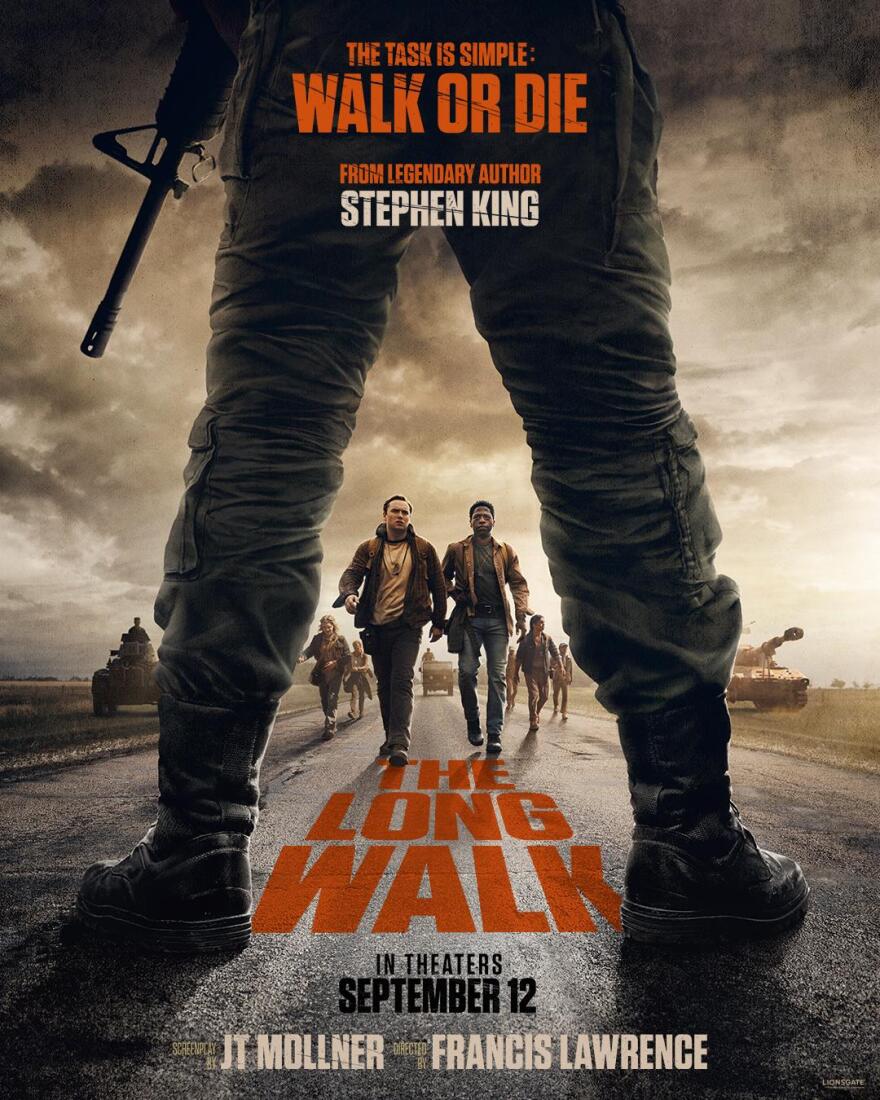In a dystopian future when the U.S. is struggling to recover from a large war and wading through an economic crisis, a group of 50 teenage boys volunteer for an annual event called "The Long Walk." That’s what this film is called: "The Long Walk.'
All the boys are assigned to walk together for as long as possible on a stretch of empty road; the last one standing is the winner. Each has to maintain a minimum speed and stay on the road’s pavement or risk getting shot by a team of armed soldiers who follow the boys in military tanks and trucks. No sleeping is allowed and no stopping is allowed, but the boys are given food and water along their journey. The winner receives a life-changing cash prize and one wish of their choosing. Good luck if a boy has a rock in their shoe, a charley horse, or a stray shoelace.
"The Long Walk" is adapted from a Stephen King novel, but I wouldn’t categorize this film as horror. "The Long Walk" was published in 1978 and is only the sixth novel from Stephen King, although it was published under his pseudonym Richard Bachman.
At first look, it’s a despairing commentary on the different classes of society enduring the hardships of life and building relationships with each other along the way. But after a closer look, it’s a critique of late-stage capitalism, the competitive mentality of eat or be eaten, and the oppression of autocracy. Because of these critiques and metaphors, "The Long Walk" reminds me of the "Hunger Games" films (2012-2015) and the "Squid Game" TV series (2021-2025). This premise of desperate people competing for survival can also be seen in the 1969 film, "They Shoot Horses, Don’t They?"
So "The Long Walk" easily resonates with the climate of current events in our country from income insecurity to sex trafficking of minors to the glamorizing of violent athletic spectacle. But I finished this film thinking it was just okay. The messaging is clear and timely, but I couldn't let go of the fact this film is retreading very familiar ground. The unyielding moments of violence add horror-adjacent gore to show the cruel treatment of the boys (many gunshot executions are shown completely with blood and brains exploding). Sadly, this gore feels superfluous after the first death, and when a boy has a diarrhea emergency, I started to question the moral limits of visual effects.
All the actors give performances full of intensity and feeling, but they're all obviously cast in this to fill the various archetypes of manhood and American exceptionalism. These archetypes include a cocky jock (athlete), a nerdy writer recording his experience (journalist), a wisecracking joker (comic relief), a poet, a villain, and an ordinary everyman. I get the varying characters offer someone each viewer can grab onto and cheer for, but I struggled to do that since I could already predict who was going to win the walk in the film's first 30 minutes. (Maybe I've watched too many reality competition TV shows.)
The dialogue between the boys reveals a few of their backgrounds, and some of them make friends with each other while others find enemies. Watching these connections develop is moderately interesting, but some of this dialogue feels tedious and categorical. And I had a difficult time understanding the words from British actor David Jonsson ("Alien: Romulus," 2024). His creation of a believable American accent is inconsistent which is a shame since he gives such a forceful yet tender-hearted performance.
American director Francis Lawrence gave audiences four Hunger Games films before "The Long Walk," and it's easy to see his specific vision at work here. He knows how to capture the mood of a realistic dystopia, but his storytelling is still like a paint-by-numbers sketchbook. This ominous look at humanity's future might be galvanizing to lots of younger viewers, but I can't shake the feeling that I've seen "The Long Walk" too many times before.




